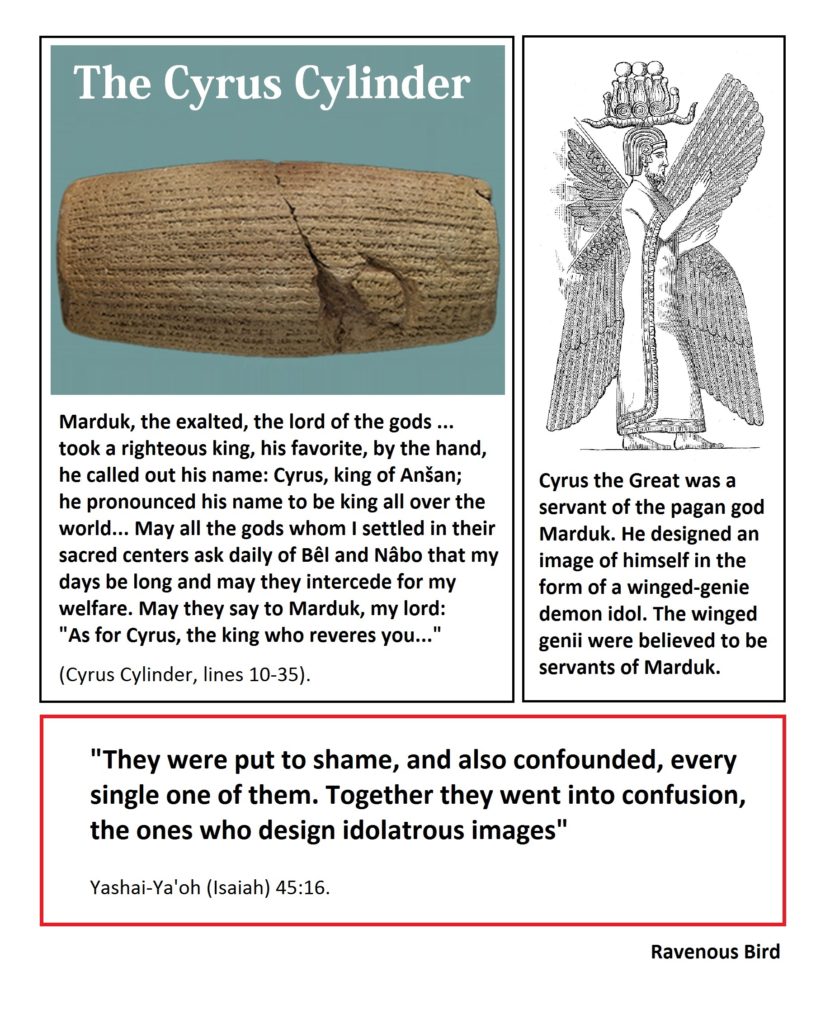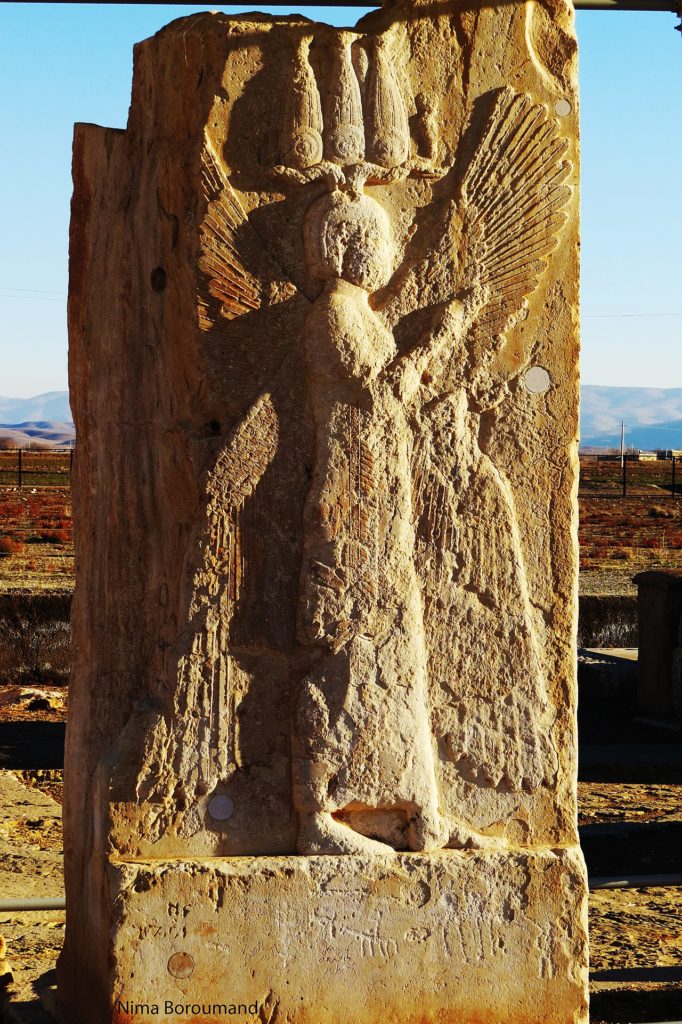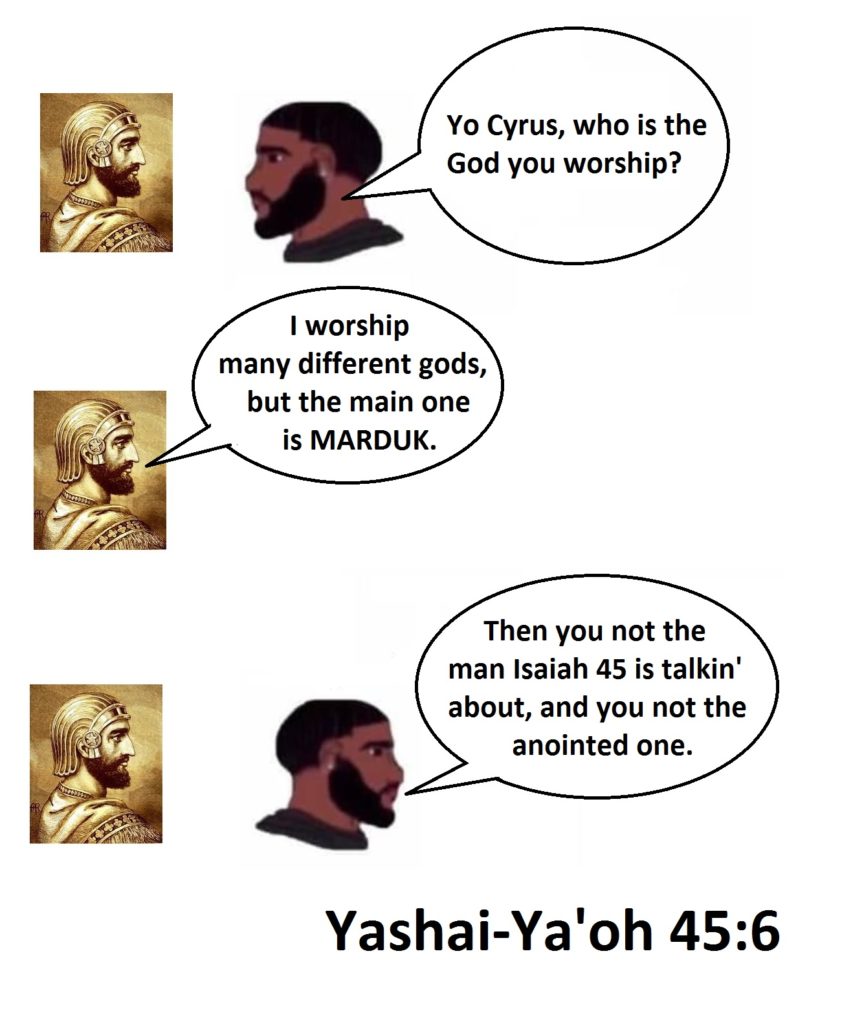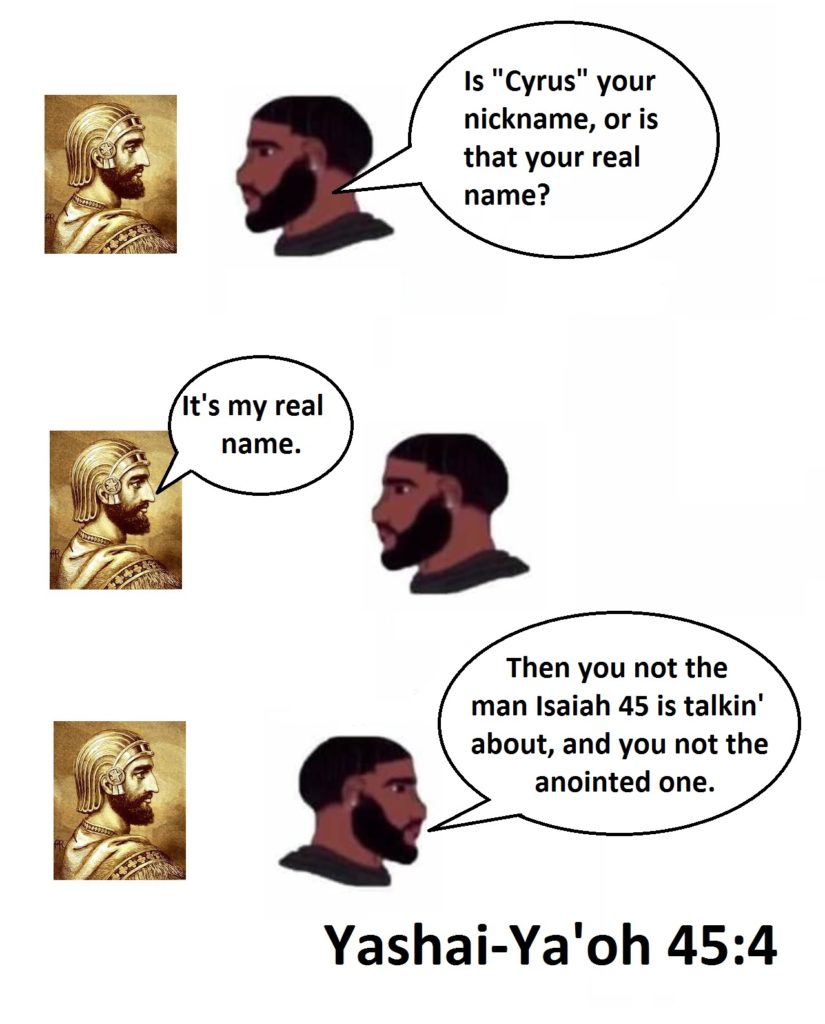

wa-shacharaym /ושכרים
conjunction
active participle (noun), masculine, plural, absolute
“and the ones hired”
ghalay-ham /עליהם
preposition
pronominal suffix 3pmp
“against them”
yotsaym /יועצים
emphasized active participle (noun), masculine, plural, absolute
“the ones who counsel”
la-hapar /להפר
preposition
verb, root פרר, causative stem, infinitive construct
“to cause to frustrate”
ghatsatham /עצתם
noun, feminine, singular, construct
pronominal suffix 3pmp
“their counsel”
chal /כל
noun, masculine, singular, construct
“all of”
yamay /ימי
noun, masculine, plural, construct
“the days of”
Charash /כרש
proper name, i.e. “Cyrus”
malach /מלך
noun, masculine, singular, construct
“king of”
Paras /פרס
proper locative noun, i.e. “Persia”
Translation:
“and the ones hired against them, the ones who counsel to cause to frustrate their counsel all of the days of Cyrus king of Persia…” (Ezra 4:5)
According to this verse, the counsel to rebuild the temple was frustrated and it was not carried out at all in all the days of Cyrus of Persia. In other words, his decree was not realized in his lifetime and he did nothing to stop those who were against us and frustrating the counsel. The temple was not built until many years after Cyrus’s death.
Yet the scripture talks about a “Cyrus” who would build the city of YA’OH himself: “He will build my city” (Yashai-Ya’oh 45:13). It does not say he would give an order for a city to be built and that the order would never be carried out during all the days of his life. It says HE WILL BUILD MY CITY. You have to be alive in order to do this. You cannot be dead years in advance.
The decree of Cyrus issued in his own words is only found in Ghazar’a (Ezra) 6:3-5 does not even say anything about rebuilding a city. It only allows for the house of YA’OH to be built, not the city. But neither a temple of YA’OH nor a city of YA’OH were built by Cyrus. That would be like saying Doayd (David) built the First Temple simply because he gave an order for its construction. Doayd did not build the First Temple. His son Shalamah (Solomon) did. Neither did Cyrus build one.
The original decree of Cyrus is written in Aramaic which was the imperial language of the Persian empire. The other versions of this decree found in 2 Chronicles 36:23 and Ghazar’a 1:2-4 are written in Ghabaray (Biblical Hebrew). These were not written by Cyrus and the wording is completely different from the actual decree found in the royal archives at the capital of Media. Compare them side by side and see for yourself. These versions in 2 Chronicles 36:23 and Ghazar’a 1:2-4 are paraphrases of the original Aramaic decree. They were written in our language by one of our people and intended to be read by our people only.
Why is this important to know? Because in the original decree Cyrus does not say that our Ala’aym is the supreme deity of heaven and earth. What he said is that our Ala’aym is the deity who has a house is at Yaroshalam (Ghazar’a 6:3). In other words, Cyrus only acknowledged that our Ala’aym was the deity of just Yaroshalam (Jerusalem) and not of heaven and earth. This is in agreement with Cyrus’s other writings, such as the Cyrus Cylinder (see above graphic), where he recognizes the gods of other races as being the gods of just those specific localities where they had temples in their names. Yet, the paraphrases of the decree in 2 Chronicles 36:23 and Ghazar’a 1:2-4 suggest that Cyrus feared our Ala’aym as the supreme deity of heaven. This is not the case, far from it in fact, not when you read his own words. Cyrus the Great believed the Babylonian god Marduk was the supreme deity over all other deities. There is no record in his own words where he ever says anything to the contrary. He was a firm believer in idolatry and paganism.

Cyrus was so committed to the paganism of Marduk that he had an idol image of himself made where he depicted himself as a four-winged genie demon (see photo above). The winged genii were believed to be SERVANTS OF MARDUK. Yashai-Ya’oh (Isaiah) 45:16 condemns anyone who makes idol images, and yet this entire chapter of Yashai-Ya’oh is believed to be talking about Cyrus of Persia as being the anointed one. How can that be when Cyrus of Persia not only did not fear YA’OH, but made an idol image of himself as a four-winged genie servant of Marduk? This makes no sense.

So why do the paraphrase versions of his decree make it seem like Cyrus the Great feared our Ala’aym as the supreme deity when he in fact did not? Because our people knew who really made Cyrus issue his decree even if Cyrus the pagan idol worshiper himself didn’t believe that. So in the paraphrase versions we gave the credit to where the credit was due regardless of Cyrus’s own personal religious beliefs. That fact is that our Ala’aym was not feared by Cyrus as the supreme deity of heaven. This fact is also proven by how Cyrus did not allow the second temple to be rebuilt according to its original size. The dimensions he specified in his original decree calls for a much smaller building than what King Shalamah built. Why? Because a building the size that Shalamah built would have cost a lot more money and Cyrus was only willing to give enough money for the smaller size that he specified in his decree.
Herod the Great (36-3 BCE) used this as an argument to take down and rebuild the whole temple in order to raise it up to its original height during his reign because the small one Cyrus allowed to be built was shameful and disgraceful compared to the First Temple of Shalamah. You can read about this for yourself in Josephus, Antiquities, 15.11.1; and Josephus, Wars, 1.21.1. Even the elders of our people who had seen the First Temple, when they saw the foundations of the Second Temple being laid, they were not impressed and many wept (Ghazar’a 3:12). Does this sound to you like Cyrus the Great was a man who feared our Ala’aym as the supreme deity of heaven? If it does you may need your head examined.
If Cyrus the Great believed our Ala’aym was the supreme deity he would have made the temple of YA’OH just as big or bigger than Shalamah’s temple. If he thought our Ala’aym was the supreme deity there shouldn’t have been another temple anywhere in his entire kingdom that could rival the temple of YA’OH, but go have a look at how grand and how massive the temple of Marduk was at Babylon. This is the temple of the god Cyrus held to be supreme over all other gods and it shows. He made sure the temple of our Ala’aym would be insignificant and inferior compared to his god Marduk’s temple.
These are not my opinions. These are not semantics either. These are facts which religious Christians and religious Jewish commentators of the bible want you to gloss over and ignore. But critics of the bible do not gloss over and ignore them. Critics of the bible jump on these facts in order to demonstrate that the bible is just a literary work of confused wishful thinking and fairy tales, and not a reliable source of history or genuine prophecy.
According to bible critic R. N. Whybray, the author of the so-called Deutero-Isaiah (Isaiah chapters 40–55) was in error, for he thought that Cyrus would destroy Babylon but he didn’t. Cyrus did the exact opposite. He made Babylon more splendid than ever, and he made rich offerings to the temples of the various gods worshiped in Babylon. He did allow the Hebrew exiles to return home, but the return was not anywhere near to the triumphant manner in which the author of Deutero-Isaiah was expecting. Nor was the decree by Cyrus to restore the temple ever carried out by Cyrus during his lifetime (R. N. Whybray, The Second Isaiah [T&T Clark Study Guides, 2004], p. 10).
Cyrus of Persia did not build a city of YA’OH, but the bible says that someone nicknamed “Cyrus” is supposed to.
“The one who says to Cyrus, ‘My shepherd,’ and all my desire will he complete, and saying to Yaroshalam: ‘You will be built,’ and to the tabernacle, ‘You will be established'” (Yashai-Ya’oh 44:28).
This verse only has a superficial connection to the historical Cyrus of Persia. He never gave any verbal command with regards to Yaroshalam (Jerusalem) saying: “You will be built”. His decree only specified that the temple could be rebuilt and that never happened during his life. You cannot say the prophecy is talking about Cyrus of Persia when he didn’t fulfill the prophecy. This is either a false prophecy, or it is not talking about the historical Cyrus of Persia and it is talking about someone else at another time period.
People will eventually have to face facts and come to terms with reality. A person is entitled to their own opinions but not their own facts. The historical Cyrus of Persia cannot be the prophetic “Cyrus” who executes all of YA’OH’s desire and His counsel. The only thing Cyrus of Persia did was issue a decree about the temple’s restoration and after that he did nothing — absolutely nothing at all for the remaining days of his life — to eliminate the opposition that was successfully preventing the decree from being carried out!
“Thus said YA’OH to His anointed one, Cyrus, who I have caused to be strengthened in the right hand of him, to spread to before him the people, and the loins of kings will I open, to open before him the two doors and gates will not be shut” (Yashai-Ya’oh 45:1).
Both Christian and Jewish bible scholars insist that this verse has to be talking about Cyrus the Persian simply because the name Cyrus (“Chorash”) appears in the verse. But look deeper.
The English translations render לרד־לפניו גוים as “to subdue nations before him,” which would suggest that the prophetic Cyrus must be a military conqueror who takes down nations by war. However, that is not what the verb רדד in this sentence means. It means “to spread” not to conquer by force of arms. The people in question are assumed to be those nations conquered by Cyrus the Persian in battle, but it makes far more sense that these people spread out before the prophetic Cyrus are only the people of Ya’oh-shar-al (Israel) who accept him as their leader and willingly follow him because they see that he was chosen by YA’OH. Doayd (David) used the same verb רדד in Mazmor (Psalm) 144:2 and he could not have possibly meant that he “conquered” his own nation! That is not what happened at all. What happened was that YA’OH “spread” the people of Ya’oh-shar-al under Doayd by causing them to willingly accept Doayd’s kingship. He will do the same for the prophetic Cyrus.
Furthermore, a man’s loins are the sensitive areas of the body below his waist and above his thighs (Exodus 28:42). To open the loins of kings is figurative language which means to soften leaders up so that they willingly do what YA’OH wants them to do. He basically has them by the balls, as we would say in today’s heathen English, and the kings are unaware of it. They cannot make choices that go against the will of YA’OH because their choices have been pre-determined for them by YA’OH.
If you know the history of Cyrus the Persian, name any king who just let Cyrus and his army enter and occupy that king’s country. You wont find one. Cyrus the Persian had to fight, conquer, and capture countries with his massive army. No king willingly gave Cyrus the Persian the right to enter his land with his Persian army. He took those lands by force, and he ended up getting himself killed in battle by trying to take the land in the southernmost portion of the Eurasian Steppe regions of modern-day Kazakhstan and Uzbekistan, which belonged to the Massagetae Scythians! Hence, this detail in verse 1 does not fit Cyrus the Persian at all.
What about the detail “the two doors and gates will not be shut”? This detail does not fit Cyrus the Persian either, because kings did shut their doors at him, and he had to force his way in by using his army. Read up on the history. The Babylonians opened their gates to him, but that was the populace and not the king. Their king was not present in the city at the time, and he refused to submit to Cyrus. So Cyrus had him captured by the Persian army.
What “the two doors and gates will not be shut” refer to are the border check points of the country that will be wide open to “Chorash” and to his people. The borders will not be closed to them when they make their Exodus to that foreign land because the leaders (i.e. the kings) of that land are being controlled by a Supreme High Power whose name is YA’OH. Their choices in this regard have been made for them by HIM in advance. This verse is talking about a Cyrus and a foreign country whose leaders give him a green light to enter and occupy their land. This isn’t Cyrus the Persian!
But, but, but, doesn’t it say Cyrus in Isaiah 45:1?!!! Yes but read verse 4 in the source language. It says this name is a nickname, an epithet, or cognomen. It is not the real name of this person.
“on account of my servant Ya’oh-ghakab, and Ya’oh-shar-al my elected one, I will call for you by a name of you I will nickname you (אכנך), and not have you known me” (Yashai-Ya’oh 45:4).
The word achan-cha /אכנך in this verse is from the root verb כנה. It is in the intensive stem, imperfect aspect, 1pcs and with a pronominal suffix 2pms. It literally means: “I will nickname/cognomen you”. So “Chorash” (כורש) is this man’s nickname, not his real name at birth. The nickname is given for the sake of the nation of Ya’oh-shar-al, so the nation may recognize him by his character when he appears. He demonstrates the character of his nickname even before he knows the one who gave it to him.
What does the name “Chorash” mean? The word “chor” (כור) is the word for the “furnace” that burns. If you are using the Strong’s concordance, look up Strong’s H3564. The word “rash” (רש) is the imperative command word derived from the verb רשש, “to beat down, shatter, smash, demolish”. If you are using the Strong’s concordance, look up Strong’s H7567. Verbs having the same second and third root letters will lose its third root letter when the verb is used as an imperative. The name “Chorash” combines a vocative with an imperative: “Furnace, smash!” The furnace that smashes is the mouth that burns, flames, humiliates, mocks, offends, and breaks down an enemy during a verbal exchange. A similar conclusion about the etymology of the name Cyrus was reached by the linguist Karl Hoffmann who contends that the name Cyrus means “humiliator of the enemy in verbal contest“.

In any event, “Cyrus” was the real name of Cyrus the Persian. It was not a nickname for him. It was his real name. So this chapter in the book of Yashai-Ya’oh was never talking about a person whose real name is Cyrus. It is talking about a man whose character fits and agrees with the meaning of his nickname Cyrus.
Yashai-Ya’oh 5:2 condemns anyone who equates evil with good and good with evil. There simply is no way Cyrus the heathen Persian who served false pagan gods like Marduk (evil) can also be the “anointed one” (good) that chapter 45 is talking about. That would be equating evil with good and good with evil.
The pagan god Marduk was the god Cyrus revered and the god whose temple he protected and enriched. He did not fear YA’OH, did not build His city, and did not build His temple. A different “Cyrus” will, and Cyrus will be his nickname not his real name, or the prophets of YA’OH are false prophets.
His name is YA’OH
Always has been. Always will be.
#EXODUS2023
1.15.7252
